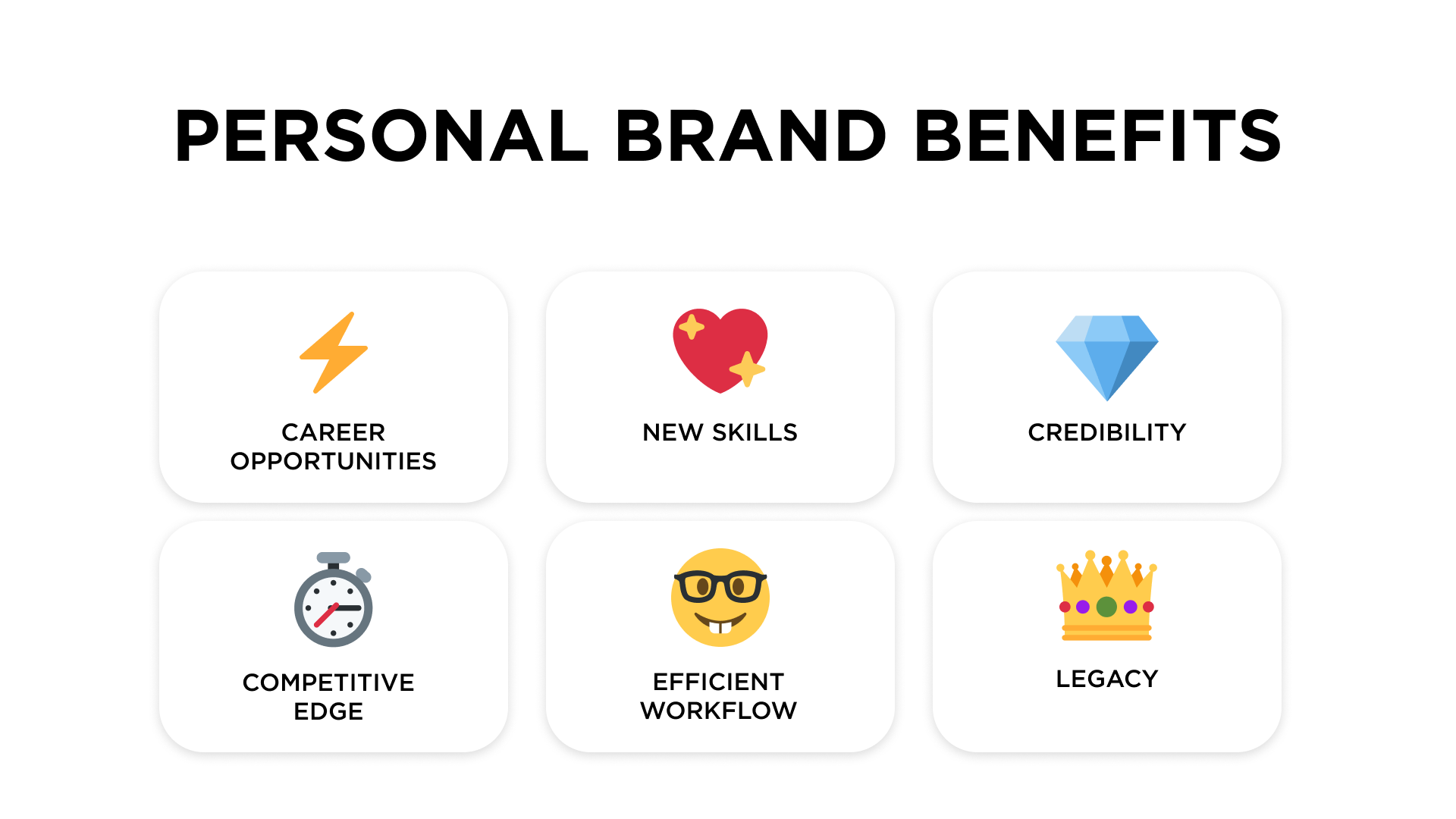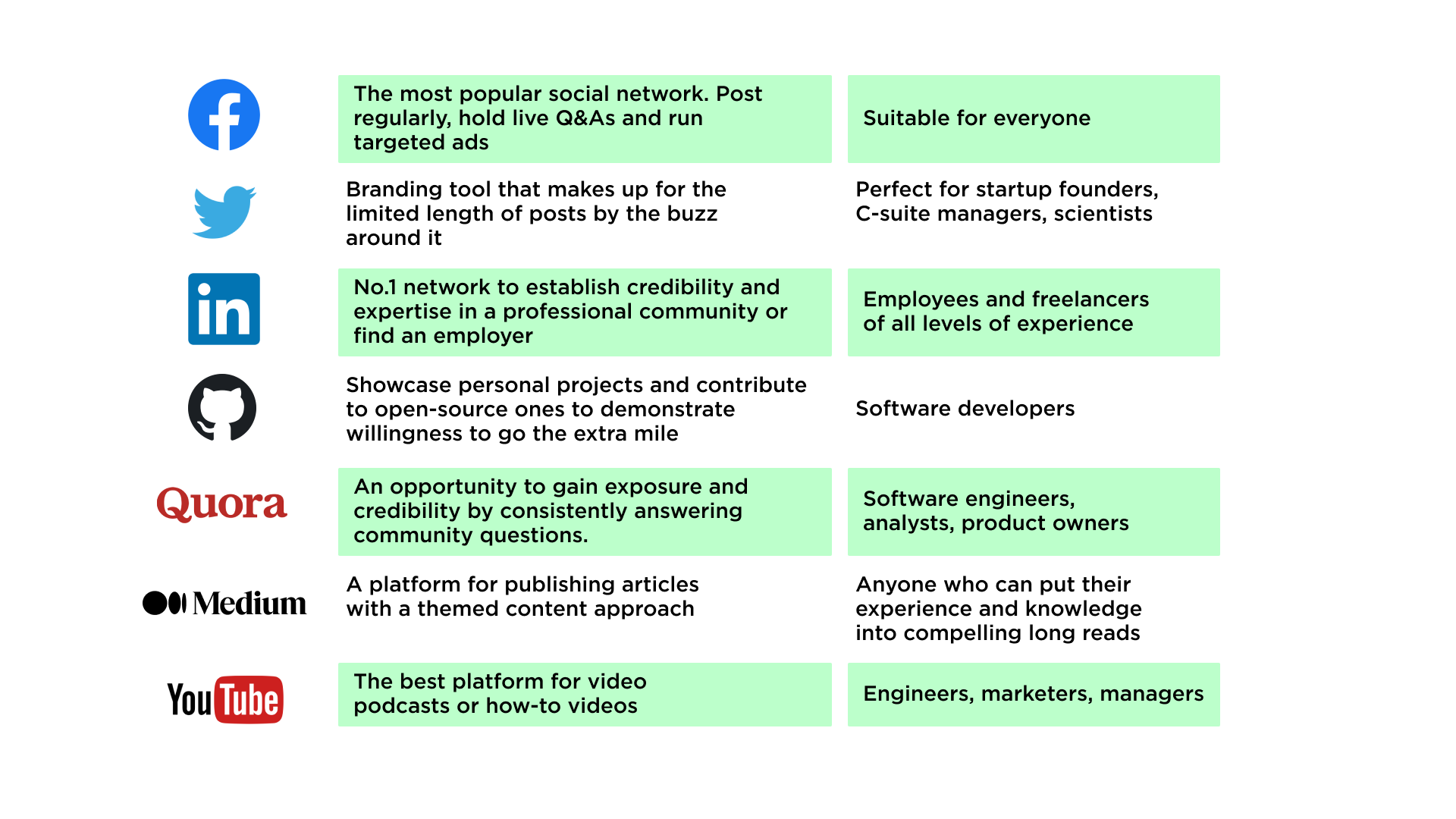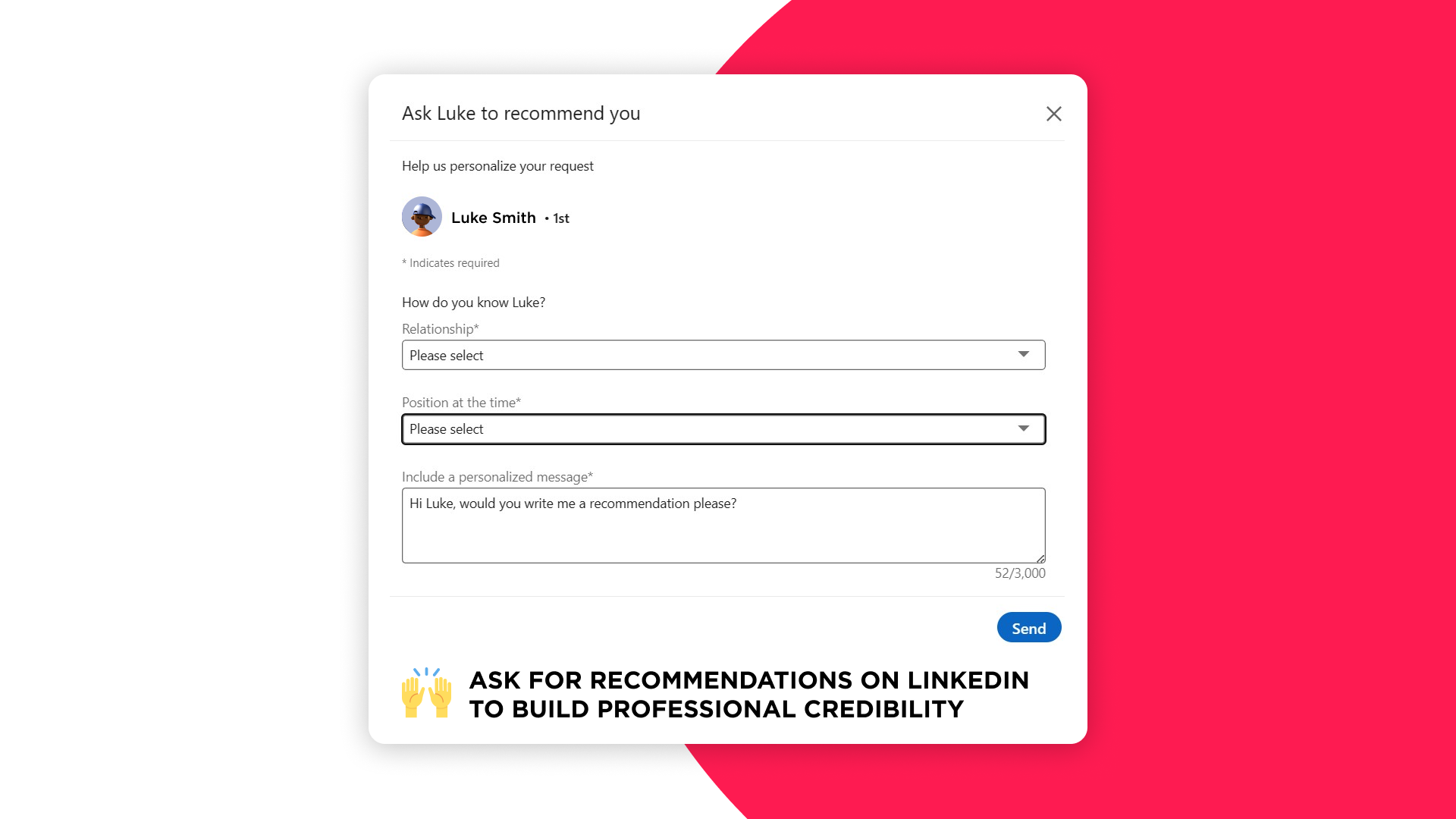How to Build a Personal Brand in Tech: 6 Steps
Learning the ropes of creating a strong professional identity.

In today's fast-paced and digitally connected world, the question of how to build a powerful personal brand has become a widespread subject among professionals in the tech industry. With more and more people competing for attention and opportunities, cultivating a distinct identity has never been more critical. A strong personal brand not only helps software developers stand out from the crowd but also opens doors to exciting career prospects, lucrative projects, and a vast network of like-minded individuals.
In the article, we will explore the art of developing a compelling personal brand in the tech domain. We’ll explore what are the benefits of building your personal brand and provide detailed steps on the process so that you can make your mark as a prominent IT expert in the digital realm.
What is a personal brand?
Personal branding refers to showcasing one's unique identity, values, skills, and expertise to create a distinct and memorable image.The process involves crafting an authentic and consistent narrative around oneself to stand out from the crowd, whether as a professional in a specific industry or as an individual with a personal mission and passion. Personal branding enables industry experts and personalities to effectively communicate their strengths and value proposition, establish credibility, and build trust with their target audience. This opens up new career opportunities, collaborations, and partnerships, as well as attracts customers who appreciate their values and offerings.
However, personal branding is not limited to professionals or entrepreneurs and is relevant to individuals who pursue hobbies or social causes as well. A personal brand can help to connect with like-minded people, inspire others, and drive positive change. It is important to note that personal branding is more than simple self-promotion. Authenticity and consistency are key elements in building a successful brand and require continuous self-reflection, learning, and growth.
Benefits of building a personal brand
Recognizing and embracing the power of personal branding can lead to unique and consistent advantages, propelling your life and career to new heights while establishing yourself as a prominent force within your chosen industry. Let's explore the benefits of cultivating your personal brand.

Enhanced career opportunities
Crafting a personal brand elevates your visibility and reputation, attracting potential employers, clients, and collaborators. Your demonstrated knowledge and accomplishments draw interest, opening up diverse opportunities, including job offers and freelancing assignments.
Acquisition of new skills
Developing a personal brand often involves honing your communication, networking, and self-marketing skills. As you build your brand, you may acquire proficiencies in content development, public speaking, social media management, and networking. These added skills enhance your marketability and create new avenues for future employment.
Enhanced credibility
A robust personal brand provides legitimacy to your professional identity. Consistently producing valuable content and showcasing expertise in your field earns you the trust and confidence of others. This enhanced credibility leads to increased trust from potential employers, clients, and colleagues, opening doors to more career opportunities.
Edge over competitors
In highly competitive fields, a strong personal brand sets you apart from peers with similar qualifications. The uniqueness and awareness of your brand give you an edge during job applications, client pitches, and contract negotiations, positioning you as the preferred choice.
Streamlined workflow
A powerful personal brand streamlines routine tasks, reducing the time spent on finding new projects or proving your abilities in every professional interaction. Your brand's reputation speaks for itself, allowing you to focus more on tasks directly related to your expertise.
Solid legacy
Your personal brand reflects the impact you've made throughout your career and the value you've brought to others. By consciously crafting an authentic and positive brand, you create a lasting legacy that extends beyond your current role or position. This legacy can significantly influence future career opportunities and leave a positive mark on your industry or community.
Embracing the potential of personal branding leads to a distinctive and consistent advantage, opening doors to unparalleled growth and recognition in your professional journey.
What makes up an effective brand
Creating an effective brand is no easy feat, but when done right, it can be a powerful tool for success. So, what aspects are included in an effective brand? Let's take a closer look.
- Distinct voice and clear values. This means knowing what you stand for and how you want to communicate that message to your audience. Your brand voice should be authentic and not feel robotic, and it should speak directly to your audience in a way that resonates with them.
- Compelling content. This includes what you are promoting and how you present it. Whether through entertainment or education, your content should be engaging and valuable to your target audience.
- Creativity. Having a unique trademark can help your brand stand out from the crowd. This could be something as simple as a color scheme or logo, or something more complex, like a distinctive writing style of blog posts.
- Personality. There is no one-size-fits-all personality type for a brand, so it's important to be true to yourself and your values. Whether you're energetic, laid back, or formal, your personality should shine through in all aspects of your brand.
- Authenticity is also crucial when it comes to building a brand. Your personal brand shouldn't feel made up out of thin air — it should align with who you are as a person. When you're authentic, your brand will never feel forced or fake, and your audience will be more likely to connect with you on a deeper level. So, be true to yourself and let your brand reflect the real you.
6 steps to create a strong personal brand
While there is no one-guide-fits-all when it comes to building a personal brand, there are some steps you will likely have to take in order to establish and reinforce your personal image, story, and brand appearance.
Come up with a unique value proposition
As a professional in your field, it is important to understand your strengths, skills, and experiences that differentiate you from others. By recognizing your unique qualities, you can determine the specific benefits you can offer to your target audience. This allows you to craft a compelling and concise value proposition statement that clearly communicates the unique value you bring. By doing so, you can effectively communicate your strengths and abilities to potential clients or employers and set yourself apart in your field.
Establish online presence
It is essential to create a professional website or portfolio that showcases your expertise and achievements. This platform should highlight your unique value proposition and clearly communicate the benefits you can offer to potential clients or employers. Use URL shortener to provide a neat link to your digital portfolio for clients and partners.
It is also crucial to optimize your online presence using search engine optimization (SEO) techniques. This involves using relevant keywords, creating high-quality content, and building quality backlinks to increase your visibility in online searches. By improving your search engine rankings, you can attract more traffic to your website and increase your chances of being discovered by potential clients or employers.
Participate in relevant industry events
Stay current and connected in your industry by attending conferences, seminars, workshops, and webinars. Whether offline or online, these events offer valuable opportunities to network with other professionals, learn about new trends and technologies, and gain exposure.
You may also consider becoming a speaker or panelist. By sharing your expertise with others, you can establish yourself as an authority in your field and build your personal brand. This can lead to new opportunities, both in terms of career advancement and business growth.
By being an active participant of industry-related discussions you will stay up-to-date with the latest developments in your field and develop new skills. As you establish yourself as a knowledgeable and respected professional in your field, you will likely get increased opportunities for career growth and business success.
Engage on social media platforms
By carefully selecting the social media channels relevant to your audience, you can effectively reach and engage with your potential clients or employers. Once you have identified your social media platforms, the most interesting part begins: share valuable content consistently, participate in industry-related discussions, and respond to comments or queries. By doing so, you can build a loyal following of engaged followers and establish yourself as a thought leader in your field.

Another way to build relationships and increase your social media presence is to collaborate with influencers or industry thought leaders. By partnering with these individuals, you can tap into their established networks and reach a wider audience. This can lead to increased exposure, new opportunities, and ultimately, business growth.
Build social trust with testimonials
Requesting feedback from satisfied clients, employers, or colleagues who can vouch for your skills and abilities is a great way to demonstrate your value and establish social proof. Once you have collected testimonials, be sure to display them on your website and social media platforms. To make the process even more impactful, consider using a screen recorder tool to capture their testimonials. By doing so, you can build credibility and trust with your audience, showing them that others have had positive experiences working with you.

For example, if you are a freelance writer, you could request testimonials from clients you have worked with on previous projects. These testimonials could highlight your ability to deliver high-quality content on time and within budget. You could then display these testimonials on your website and social media platforms, as well as encourage your clients to leave reviews on platforms like LinkedIn or Upwork.
In addition to displaying testimonials, it's also important to encourage clients or colleagues to leave reviews about their experience working with you on professional networking platforms or review websites. This can help to increase your visibility and attract new clients or employers.
Analyze and improve
As with any aspect of your personal or professional life, it's important to evaluate the performance and impact of your personal brand from time to time. By analyzing metrics such as website traffic, social media engagement, or audience feedback, you can gain valuable insights into how your brand is perceived and where improvements can be made.
Once you have identified areas for improvement, it's important to take action to enhance or refine your personal brand. This may involve updating your portfolio, refining your messaging, or adjusting your social media strategy. It may also involve seeking feedback from trusted colleagues or mentors to gain an outsider's perspective on your brand.
In conclusion, personal branding is not a one-time event, but a continuous process of learning, adapting, and improving. Therefore, keeping yourself updated with industry trends is crucial, and you should continuously refine your brand positioning based on feedback and data analysis. By regularly evaluating and refining your personal brand you can establish yourself as a respected and credible professional in your field, and achieve your personal and professional goals.
Summing things up
Building a personal brand as a tech professional demands careful attention and strategic planning. Personal branding demands careful attention and strategic planning, as it enables tech professionals to showcase their skills, expertise, and unique perspectives to a global audience.
Begin by defining your brand identity, highlighting your strengths, values, and mission; and don't underestimate the power of networking and collaboration. In the competitive landscape of the tech industry, a strong personal brand can be the key to unlocking limitless opportunities and making a lasting impact on the world of technology. So, take the first step today, embrace your uniqueness, and let your brand shine brightly in the digital realm.
You might be interested in similar topics
What is Conversational Marketing (Its Strategy, Benefits, and Examples)?
Emotional marketing and how to employ it properly
Real-Time Marketing: How to Use it Effectively

Subscribe to Umnico news!
Be the first to get recommendations and up-to-date information
